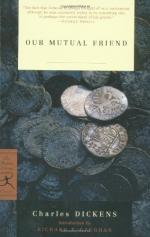|
This section contains 15,015 words (approx. 51 pages at 300 words per page) |

|
SOURCE: “‘A Speeches of Chaff’: Ventriloquy and Expression in Our Mutual Friend,” in Dickens Studies Annual, Vol. 19, 1990, pp. 247-79.
In the following essay, O'Donnell examines issues of ventriloquy and representation of narrative voice in Our Mutual Friend, suggesting that identity and relationships are called into question continuously throughout the novel.
In an age of public spectacle for which P. T. Barnum serves as the ultimate exemplar, Dickens' novels provide a succession of forays into the spectacular. The spectacle can be viewed as a displacement of “private” anxieties and fantasies onto the public stage. The authorial dream of omnipotence, for example, is represented in spectacle via the guise of the master of entertainments or the entrepreneur. This dream is countered by the illusory heterogeneity of the entertainment itself which, fractured into the diversionary activities of clowns, mimes, freaks, and the vertiginous confusion of the “three-ring” circus or sequential “side-shows...
|
This section contains 15,015 words (approx. 51 pages at 300 words per page) |

|


